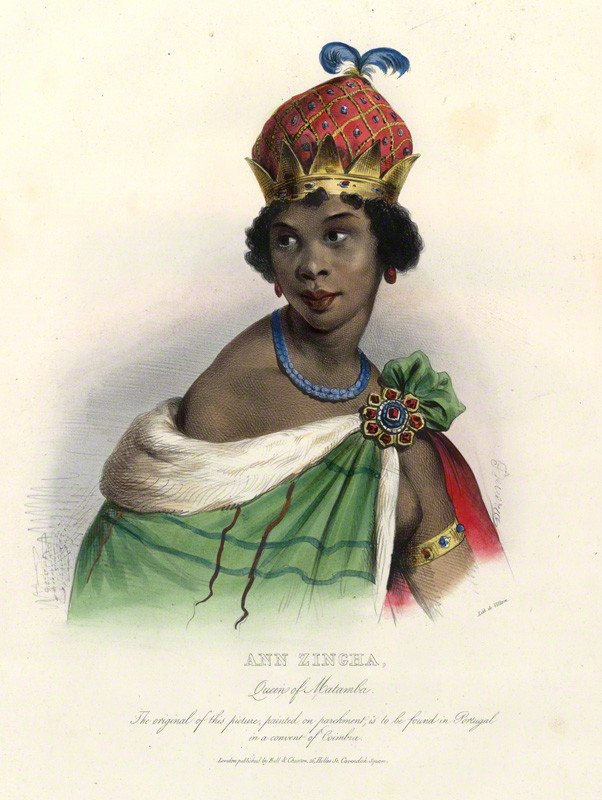
Queen
Njinga Mbande
One of the greatest queens of Angola
1583 - 1663
“Sometimes force is able to exterminate the wicked customs of those that do not use reason and do not understand any argument without punishment.”
Taken from National Portrait Gallery
Queen Nzinga/Nzingha
Queen Nzinga, one of the greatest queens of Angola, is undoubtedly the most iconic heroine of pre-colonial Africa. The astute diplomat and visionary military leader resisted Portuguese sovereignty and invasion whilst liberating her people from enslavement and surviving on the throne against substantial odds.
Her brilliance, pride, and perseverance are what make her a symbol of liberation from oppression to this day. She undoubtedly reigns as one of the most powerful rulers of Africa for her outstanding example of female governance.
Early Life
Nzinga was born into the Ndongo royal family in 1583 in central-western Africa. She was born to King Ngola Kiluanji Kia Samba and Queen Ngola Kiluanji Kia Samba. Nzinga, which means to twist or turn, is a symbolic name because she was born during a particularly difficult delivery, emerging with an umbilical cord wrapped around her neck. This was significant in Mbundu (a large ancient ethnic group found in modern-day Angola) society because it indicated that she would develop into a strong, proud, and extremely powerful individual. At her birth, a wise woman predicted that she would one day become a queen.
When she was 10 years old her father ascended the throne and became ngola also known as King of Ndongo. She was highly favored and adored by her father as she was intelligent. She was a girl and was not viewed as a potential heir like her brothers, so her father provided her with special attention such as training her to become a warrior and other important skills of a ruler. She learned how to read and write from Portuguese missionaries and so spoke the Portuguese language fluently.
Negotiation with Portuguese Slave Traders
Image taken from Wikimedia
In the late 16th century to early 17th century, the Europeans were negotiating their interests in the African slave trade and the Portuguese wanted slave labour for their new colony in Brazil. The Portuguese were also interested in silver mines. The Portuguese breached their agreement with King Kiluanji by going beyond the pre-negotiated boundaries and so the king waged war against the Portuguese.
He became more of an oppressive ruler resulting in him losing the support of his people and most importantly his family. In 1618 Queen Nzinga’s brother, Mbandi overthrew and killed his father, King Kiluanji, to take over the throne. Mbandi too was an unsuccessful ruler and acknowledged for being far too lazy and cruel. He then decided to arrange the murder of King Kiluanji’s son, his brother, to officially eliminate any threat to him still remaining on the throne, which inevitably resulted in the kingdom falling apart.
In 1622 the Portuguese arranged and initiated a peace conference with Ndonga in order to restore peaceful relations. Nzinga was nominated to represent her brother, King Mbandi, to negotiate with the Portuguese governor; Corrêa de Sousa. When she arrived at the meeting which occurred in Luanda, she noticed that the Portuguese commissioner was sitting in an armchair whilst they had just given her a carpet to perhaps stand or sit on and make her appear inferior. The Queen’s servant was immediately signaled to crouch on all four legs and Nzinga sat on her back.
This powerful gesture illustrated that she was present for the meeting on equal footing. It was at this momentous meeting where her skills as a fierce negotiator were exemplified. The negotiation was a success and an agreement of peace and the reduction of slave raiding activities had been established.
As an agreement at the time, she was also baptized into the catholic church and took the name, Dona Ana de Sousa. Her godparents were the Portuguese governor, Joao Corria de Sousa, and his wife. The peace however had a short reign as the Portuguese continued to oppress the Ndongo a year later.
Image taken from ThoughtCo
Dynamic Ruler
Months after the meeting, Nzinga triumphantly returned home and publicly humiliated her brother, Mbandi, for his frailty and lack of leadership ability. This cost him his people's support, and it is still unknown whether he committed suicide out of embarrassment or was poisoned at the request of the people by Nzinga.
In 1625, Nzinga, the Amazon Queen of Matamba West Africa was announced queen regnant of the joint Kingdoms of Ndongo and Matamba in modern-day Angola.
After the Portuguese breached their negotiated agreement, they continued to attack and demanded that Nzinga return their ‘property’ but Queen Nzinga replied:
“There are no slaves in my kingdom.”
Nzinga realized she would not be able to fight the Portuguese on her own especially after they reinstated a puppet king, Phillip. So, she escaped to the land of Matamba but would not give up on her people and so conjured a plan. She formed an alliance with the Jaga group and even managed to convince their chief to marry her. With the Jaga people behind her, she was able to conquer Matamba and declare herself as their queen.
In 1635, she formed a strong anti-Portuguese coalition, which kept the Europeans at bay for three decades. It was composed of mercenaries, Africans trained by the Portuguese, soldiers posing as defectors in order to infiltrate the Portuguese army, and other fighters all hailing from western and central Africa. She brilliantly managed to pit two major foreign powers against one another; the Dutch and Portuguese. She did this successfully by forming an alliance with the Dutch in order to minimize the slave trade and reclaim her power over Ndongo. In 1641 the Portuguese were cast out of Luanda.
After a year, the Portuguese returned and reclaimed Luanda, driving the Dutch out. As a result, Queen Nzinga returned to Matamba. She fought the Portuguese until they became a commercial state on an equal footing.
One could even argue that she was one of history's most powerful rulers as a result of her cunning and exemplary militarism and negotiation abilities. She was a visionary and astute leader.
Death
The Portuguese and their allies attempted to capture and kill Queen Nzinga on numerous occasions but they failed to do so on each attempt. She died peacefully when she was approximately 80 years old on the 17th of December in 1663. Her sister then took power and ascended the throne. After Queen Nzinga’s death it opened the door to the Portuguese slave trade and they invaded and incorporated her kingdoms into present-day Angola.
The legendary Queen’s struggle was not in vain as it inspired others to follow in her footsteps and to mount offensives against the invaders. These include Madame Tinubu of Nigeria; Nandi, the mother of the great Zulu warrior Shaka; Kaipkire of the Herero people of South West Africa; and the female army that followed the Dahomian King, Behanzin Bowelle.
Historical Mark and Legacy
Queen Nzinga is praised for her intelligence and courage. The indelible encounter of outmaneuvering Governor, João Correia de Sousa, during the 1622 peace-treaty negotiations in Luanda is regarded by many as very inspirational as her clever manipulations further highlight her intellect and power.
One of the major streets in Luanda was named after her. In 2002, in Kinaxixi an impressive square, a statue was placed to commemorate her and she is acknowledged as the Mother of Angola today. She remains the inspiration and is highly referenced in many variants of religions of African origin in countries such as Haiti and Brazil. Often, they represent her as a character or symbol of power or strength where women seek her by ritually invoking her to solve their problems. She also represents Christianity in Angola and Brazil.
Many artists, authors, and poets have been inspired by the legendary queen’s story. To mention a few; in 1975 Manuel Pedro Pacavira published the novel “Njinga Mbandi’’, in 2007 a film was made by the Brazilian film director Octávio Bezerra called “Nzinga” and many other novels, poems, and brilliant art pieces have been inspired by her to keep her legacy eternal. Her record illustrates she transcended conceptions of gender identities and is a symbol of the root of African nationalism due to her resistance to colonial rule and success in breaking the regional power of the old and ethnic provinces. Queen Nzinga was not only a phenomenal queen, military leader, diplomat, and spiritual leader but is still one of the most celebrated African queens to resist European colonization. Her remarkable legacy positions her as an African woman who changed the world.
References
Thornton, John K. “Legitimacy and Political Power: Queen Njinga, 1624-1663.” The Journal of African History, vol. 32, no. 1, 1991, pp. 25–40. JSTOR, www.jstor.org/stable/182577. Accessed 4 May 2021.
Miller, Joseph Calder. "Njinga of Matamba in a New Perspective." Journal of African History 16, no. 2 (1975), pp. 201–16.
Skidmore-Hess, Cathy "Queen Njinga, 1582–1663: Ritual, Power, and Gender in the Life of a Precolonial African Ruler." Ph.D. diss.: University of Wisconsin–Madison, 1995.
Bortolot, Alexander Ives. “Women Leaders in African History: Ana Nzinga, Queen of Ndongo.” In Heilbrunn Timeline of Art History. New York: The Metropolitan Museum of Art, 2000–. http://www.metmuseum.org/toah/hd/pwmn_2/hd_pwmn_2.htm (October 2003)
Ancient-origins.net. 2020. Queen Nzinga: A Courageous Ruler who Set Her People Free. [online] Available at: <https://www.ancient-origins.net/history-famous-people/queen-nzinga-ruler-who-set-her-people-free-006235> [Accessed 4 May 2021].
geni_family_tree. n.d. African Queens genealogy project. [online] Available at: <https://www.geni.com/projects/African-Queens/6617> [Accessed 4 May 2021].
African Feminist Forum. n.d. Queen Nzinga » African Feminist Forum. [online] Available at: <http://www.africanfeministforum.com/queen-nzinga-angola/> [Accessed 4 May 2021].
Factinate. n.d. 42 Powerful Facts About Nzinga, Africa's Fierce Warrior Queen. [online] Available at: <https://www.factinate.com/people/facts-queen-nzinga/> [Accessed 4 May 2021].
Biography.yourdictionary.com. n.d. Anna Nzinga. [online] Available at: <https://biography.yourdictionary.com/anna-nzinga> [Accessed 4 May 2021].
Encyclopedia.com. n.d. Anna Nzinga | Encyclopedia.com. [online] Available at: <https://www.encyclopedia.com/history/encyclopedias-almanacs-transcripts-and-maps/anna-nzinga> [Accessed 4 May 2021].
En.unesco.org. n.d. Njinga Mbandi | Women. [online] Available at: <https://en.unesco.org/womeninafrica/njinga-mbandi-1> [Accessed 4 May 2021].
Holiday, L., 2020. Queen Nzinga of Ndongo & Matamba. [video] Available at: <https://www.youtube.com/watch?v=kx6XIYz7FOg> [Accessed 4 May 2021].
BBC News Africa, 2016. Queen Njinga Mbande - African Women You Need to Know. [video] Available at: <https://www.youtube.com/watch?v=TPyy9gsu86Y> [Accessed 4 May 2021].




